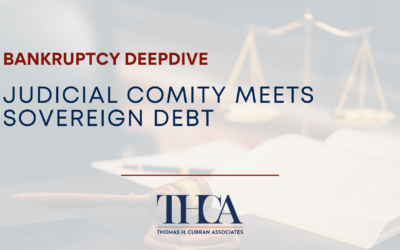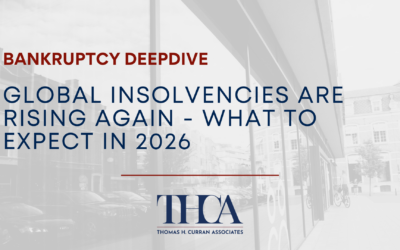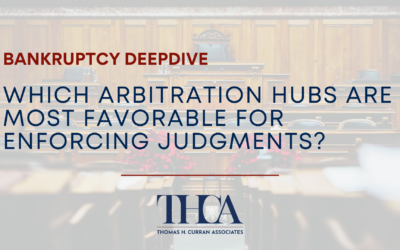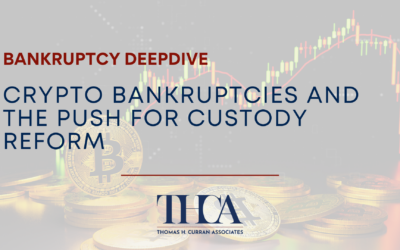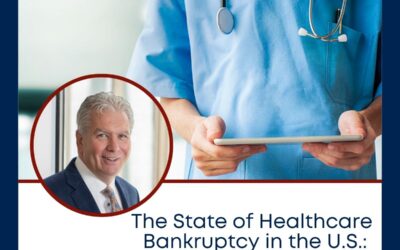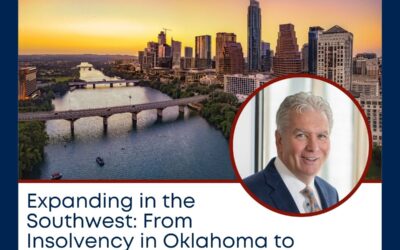What is the Difference Between Chapter 7 Chapter 11 and Chapter 13 Bankruptcy?
When a business or individual is considering filing for bankruptcy, they should understand what the differences are between the three most common forms of bankruptcy: Chapter 7, Chapter 11, and Chapter 13. All three types of bankruptcy provide the debtor with an automatic stay that immediately stops all collection activities, but each offers debtors different benefits and obligations.
In the following sections, we will provide a quick overview of the three most common types of bankruptcy and the benefits and limitations of each one.
Chapter 7 Bankruptcy Facts
Chapter 7 bankruptcy is known as liquidation bankruptcy because the assets of the business or individual who filed for bankruptcy will be turned over to a bankruptcy trustee who will liquidate the debtor’s assets and distribute the proceeds from their sale to creditors. The major advantage of a Chapter 7 bankruptcy is that it is usually completed relatively quickly and will relieve the debtor of most unsecured debts (unsecured debts are those for which the debtor has offered no collateral to the creditor).
However, should the debtor want to keep anything used as collateral to secure a loan, such as a car or house, the debtor must continue making payments on the loan. To discharge those types of secured debts, the debtor will need to surrender the collateral to the creditor.
Finally, if the debtor is an individual, he or she must meet certain income requirements. As a general rule, the debtor must have an income that is either less than the median income for similar-sized households in the same state or pass a means test that takes the debtor’s income, expenses, and family size into account.
Chapter 11 Bankruptcy Facts
Chapter 11 bankruptcy is used by viable businesses experiencing financial difficulties to reorganize their debts to continue operating. While there are limited circumstances where an individual may file for Chapter 11 bankruptcy, it is usually utilized by businesses. One of the key advantages of a Chapter 11 bankruptcy is that the business’s current owners will continue to operate the company as the debtor in possession.
After filing for Chapter 11 bankruptcy, the debtor in possession will draw up and file a reorganization plan with the Bankruptcy Court that lays out the substantive rights of the debtor and creditors. The reorganization plan usually seeks to restructure the debtor’s obligations by securing more favorable loan terms from creditors, giving lenders priority on earnings, or by rejecting and canceling some executory contracts like property and equipment leases. If the debtor is insolvent, the restructuring may leave it with no assets and the creditors owning the company.
When a Bankruptcy Court judge has confirmed the reorganization plan, the debtor will be discharged from any debts not addressed in the plan upon its completion. The debtor will be required to repay creditors under the terms of the plan and the creditors are barred from communicating with the debtor.
Chapter 13 Bankruptcy Facts
Chapter 13 bankruptcy proceedings allow individuals with a regular income to implement a plan allowing them to repay some of their debts without forfeiting many assets. Under most Chapter 13 plans, the debtor repays creditors over three to five years using his or her disposable income and any unpaid unsecured debts will be discharged.
After filing for Chapter 13 bankruptcy, the debtor will file a plan with the Bankruptcy Court that outlines how he or she intends to repay creditors through fixed regular payments to the bankruptcy trustee. If the plan is approved by the judge the trustee will distribute the funds to creditors under the plan’s terms. When the repayment plan has been completed the debtor is entitled to a discharge of any unsecured debts not repaid under the plan.
Chapter 7 vs. Chapter 11 Bankruptcy for Businesses
The fundamental difference between Chapter 7 and Chapter 11 bankruptcy proceedings is that Chapter 7 is a liquidation bankruptcy where the business assets will be liquidated to repay creditors and the business will cease operations. This is often the best option for businesses that are no longer viable and need to declare bankruptcy to protect their owners from creditors while they wind down operations.
A business should file for Chapter 11 bankruptcy when its owners believe the company can return to profitability if it receives temporary protection from creditors that will allow it to restructure its debt and reorganize its operations.
Chapter 7 vs. Chapter 13 Personal Bankruptcy
Individuals filing for Chapter 7 bankruptcy seek to quickly wipe out most of their unsecured debts, including credit cards and medical bills, without carrying out a repayment plan. However, during a Chapter 7 proceeding, the bankruptcy trustee is likely to sell most of the debtor’s non-exempt property to repay creditors, resulting in the loss of most assets. Additionally, debtors who have above-average incomes are often barred from utilizing Chapter 7.
Chapter 13 bankruptcy allows individuals who are earning a steady income to repay a portion of their debts while retaining most of their assets. A key selling point for most debtors who opt to file for Chapter 13 bankruptcy is that they can often keep their home. However, while Chapter 7 bankruptcy allows a debtor to quickly wipe out their unsecured debts and start over, the Chapter 13 debtor must follow a three-to-five-year repayment plan before those debts are discharged.
Our Attorneys Can Help
Before deciding to file for bankruptcy, a business or individual experiencing financial hardship should consult with an attorney who can look at the facts to assess whether bankruptcy really is their best option and which type of bankruptcy best addresses their current financial situation. The attorneys at Thomas H. Curran Associates have decades of experience helping clients decide whether a personal or business bankruptcy is best suited for them and which type of bankruptcy will serve them best. Our attorneys will assist clients with filing the necessary paperwork, dealing with the bankruptcy trustee, negotiating with creditors, and taking the other steps needed to ensure that the client exits the bankruptcy process with as many assets as possible.
Bankruptcy Practice Results
Recent successful cases handled by the attorneys from Thomas H. Curran Associates. Find more here »
Supreme Court Denies Final Appeal, Finalizing Judgement Obtained by THCA
On June 24, 2024, the Supreme Court of the United States declined the petition to review filed by Sean Dunne and his ex-wife Gayle...
Thomas H. Curran Associates Secures Appellate Victory as Massachusetts Supreme Judicial Court Denies Appellant’s Attempt to Shortcut Ordinary Appellate Review
Thomas H. Curran Associates recently obtained an appellate victory in the Massachusetts Supreme Judicial Court on May 26, 2023, in the...
Thomas H. Curran Associates win is Affirmed in Florida, U.S. District Court – Client Wins Attorneys Fees
Law: Federal Rule of Civil Procedure 37(a)(5) Case: Premier Capital, LLC v. Larry Bryan (AP) Underlying Bankruptcy Case: In re Larry Bryan...
The Second Circuit Affirms Bankruptcy Fraud Judgment Obtained by Thomas H. Curran Associates, Recognizing the Continuous Concealment Doctrine
Law: Continuous concealment doctrine, 11 USC § 727(a)(2)(A), In re Olivier, 819 F.2d 550 (5th Cir. 1987); In re Boyer, 328 F. App’x 711,...
Thomas H. Curran Associates prevails on barring discharge due to fraud by debtor
Thomas H. Curran Associates recently secured a victory on behalf of an institutional asset manager, where the Bankruptcy Court for the...
Thomas H. Curran Associates prevails on post-trial motions and obtains full security for $23 million dollar financial fraud judgment on behalf of chapter 7 bankruptcy trustee
On February 8, 2022, the United States District Court for the District of Connecticut (Meyer, J.) enter its Order denying defendant Gayle...
Supreme Court Denies Final Appeal, Finalizing Judgement Obtained by THCA
On June 24, 2024, the Supreme Court of the United States declined the petition to review filed by Sean Dunne and his ex-wife Gayle...
Thomas H. Curran Associates Secures Appellate Victory as Massachusetts Supreme Judicial Court Denies Appellant’s Attempt to Shortcut Ordinary Appellate Review
Thomas H. Curran Associates recently obtained an appellate victory in the Massachusetts Supreme Judicial Court on May 26, 2023, in the...
Thomas H. Curran Associates win is Affirmed in Florida, U.S. District Court – Client Wins Attorneys Fees
Law: Federal Rule of Civil Procedure 37(a)(5) Case: Premier Capital, LLC v. Larry Bryan (AP) Underlying Bankruptcy Case: In re Larry Bryan...
The Second Circuit Affirms Bankruptcy Fraud Judgment Obtained by Thomas H. Curran Associates, Recognizing the Continuous Concealment Doctrine
Law: Continuous concealment doctrine, 11 USC § 727(a)(2)(A), In re Olivier, 819 F.2d 550 (5th Cir. 1987); In re Boyer, 328 F. App’x 711,...
Supreme Court Denies Final Appeal, Finalizing Judgement Obtained by THCA
On June 24, 2024, the Supreme Court of the United States declined the petition to review filed by Sean Dunne and his ex-wife Gayle...
Thomas H. Curran Associates Secures Appellate Victory as Massachusetts Supreme Judicial Court Denies Appellant’s Attempt to Shortcut Ordinary Appellate Review
Thomas H. Curran Associates recently obtained an appellate victory in the Massachusetts Supreme Judicial Court on May 26, 2023, in the...
Thomas H. Curran Associates win is Affirmed in Florida, U.S. District Court – Client Wins Attorneys Fees
Law: Federal Rule of Civil Procedure 37(a)(5) Case: Premier Capital, LLC v. Larry Bryan (AP) Underlying Bankruptcy Case: In re Larry Bryan...
Bankruptcy Areas of Expertise
- Bankruptcy Litigation
- Bankruptcy Trustee Representation
- Avoidance & Recovery Actions
- Chapter 11 Trustees & Examiners
- Discharge Litigation
- Bankruptcy Fraud Investigations
- Cross Border Foreign Litigation
- 363 Bankruptcy Sales
- Bankruptcy Preference Actions
- Involuntary Bankruptcy
- Chapter 11/13 Plan Objections
Bankruptcy News
Judicial Comity Meets Sovereign Debt
Judicial comity is a discretionary doctrine by which U.S. courts recognize the legislative, executive, or judicial acts of another nation,...
Global Insolvencies Are Rising Again – What To Expect in 2026
After several years of economic turbulence, a renewed rise in global insolvencies is expected in 2026. According to Allianz Trade’s Global...
Which Arbitration Hubs Are Most Favorable for Enforcing Judgments?
As insolvency disputes increasingly intersect with international arbitration, creditors are asking: which jurisdictions provide the most...
Crypto Bankruptcies and the Push for Custody Reform
The crypto sector remains under intense financial and regulatory scrutiny. The U.S. House of Representatives passed the Digital Asset...
The State of Healthcare Bankruptcy in the U.S.: Why 2025 Is a Turning Point
Jennifer Riggins sits down with Thomas Curran, Managing Partner of Thomas H. Curran Associates, to unpack the accelerating wave of...
Expanding in the Southwest: From Insolvency in Oklahoma to Asset Recovery in Texas
In this episode, Jennifer sits down with Thomas Curran, founder of Thomas H. Curran Associates, to explore the rapidly evolving world of...
Judicial Comity Meets Sovereign Debt
Judicial comity is a discretionary doctrine by which U.S. courts recognize the legislative, executive, or judicial acts of another nation,...
Global Insolvencies Are Rising Again – What To Expect in 2026
After several years of economic turbulence, a renewed rise in global insolvencies is expected in 2026. According to Allianz Trade’s Global...
Which Arbitration Hubs Are Most Favorable for Enforcing Judgments?
As insolvency disputes increasingly intersect with international arbitration, creditors are asking: which jurisdictions provide the most...
Crypto Bankruptcies and the Push for Custody Reform
The crypto sector remains under intense financial and regulatory scrutiny. The U.S. House of Representatives passed the Digital Asset...
Judicial Comity Meets Sovereign Debt
Judicial comity is a discretionary doctrine by which U.S. courts recognize the legislative, executive, or judicial acts of another nation,...
Global Insolvencies Are Rising Again – What To Expect in 2026
After several years of economic turbulence, a renewed rise in global insolvencies is expected in 2026. According to Allianz Trade’s Global...
Which Arbitration Hubs Are Most Favorable for Enforcing Judgments?
As insolvency disputes increasingly intersect with international arbitration, creditors are asking: which jurisdictions provide the most...
Contact Us
Are You In Need of Legal Counsel for a Bankruptcy Matter, Business Transaction, or Commercial Litigation?
Contact our team today.
Call us at (617) 207-8670 or use the quick contact form below.
Austin Office
7710 N. FM 620
Building 13-D
Austin, TX 78726
Boston Office
15 Broad Street
Suite 610
Boston, MA 02109
New York Office
305 Broadway, Suite 700
New York, NY 10007
London Office
The Leadenhall Building
Level 30
122 Leadenhall Street
London EC3V 4AB
Tags: what is the difference between chapter 7 chapter 11 and chapter 13 bankruptcy chapter 7 vs chapter 11 vs chapter 13 bankruptcy bankruptcy chapter 7 vs 11 vs 13

